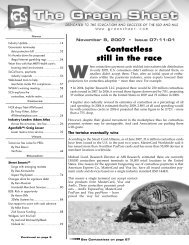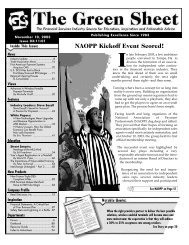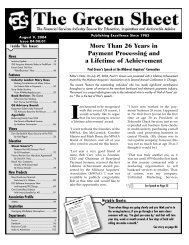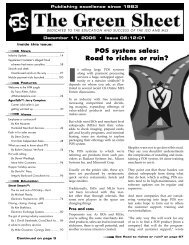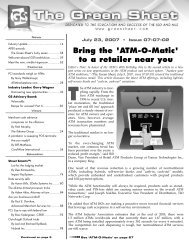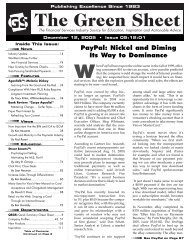Checks ? Here Today, Here Tomorrow Visa and ... - The Green Sheet
Checks ? Here Today, Here Tomorrow Visa and ... - The Green Sheet
Checks ? Here Today, Here Tomorrow Visa and ... - The Green Sheet
You also want an ePaper? Increase the reach of your titles
YUMPU automatically turns print PDFs into web optimized ePapers that Google loves.
Page 3<br />
are losing their<br />
CHECKS from Page 1<br />
desire to continue<br />
to use paper<br />
even though developing systems may be converting their<br />
checks <strong>and</strong> h<strong>and</strong>ing them back to them, as Federal<br />
Reserve Vice Chairman Roger Ferguson noted in his<br />
Sept. 4, 2001 speech to a banking symposium in<br />
Philadelphia.<br />
“<strong>The</strong> past few years have seen varied levels of development,<br />
both here <strong>and</strong> abroad, of new card-based <strong>and</strong> software-based<br />
payment instruments <strong>and</strong> systems, such as<br />
electronic money <strong>and</strong> Internet payment systems,”<br />
Ferguson said, “yet cash <strong>and</strong> checks remain mainstays of<br />
retail commerce in the United States. This is a testament<br />
to the broad convenience of these instruments, developed<br />
over a long period, <strong>and</strong> the public’s confidence in them.”<br />
However, we must realize there is still a lot of work to do,<br />
as two subsequent stories in this issue make clear.<br />
For check conversion to have any prolonged success,<br />
many problems must be solved. On Page 9, CEO Gerard<br />
F. Milano of the Western Payments Alliance shows how<br />
hard his organization is working to provide solutions.<br />
<strong>The</strong> second story, on Page 15, points out that, while the<br />
task of bringing the paper <strong>and</strong> ACH system into alignment<br />
is formidable, not all of the hurdles are in the banking<br />
system. Strong opposition exists to the idea of converting<br />
business checks to ACH items at the point-ofsale.<br />
Major businesses’ corporate cash managers cannot imagine<br />
one of their employees carrying business checks into<br />
another business for payment <strong>and</strong> being permitted to give<br />
consent to debit the corporation’s account. <strong>The</strong>y say that<br />
conversion of business checks will “seriously disrupt<br />
cash-management practices” in the U.S.<br />
One thing for sure is true: A lot of work lies ahead for<br />
check electronification in the U.S.<br />
RULING from Page 1<br />
that these rules have the effect of<br />
“limiting output of American<br />
Express <strong>and</strong> Discover cards in the<br />
United States, <strong>and</strong> of restricting the<br />
competitive strength of American<br />
Express <strong>and</strong> Discover by restraining<br />
their merchant acceptance levels <strong>and</strong><br />
their ability to develop <strong>and</strong> distribute<br />
new features such as smart cards. As<br />
a result, the types <strong>and</strong> number of<br />
American Express <strong>and</strong> Discover<br />
cards have been limited <strong>and</strong> consumers<br />
have been deprived of the<br />
ability to obtain combinations of the<br />
unique features of their preferred<br />
bank <strong>and</strong> each of the four networks.”<br />
Government officials also argued<br />
that <strong>Visa</strong> <strong>and</strong> MasterCard should be<br />
forced to alter their practice, known<br />
as “dual governance,” whereby<br />
directors of one association were<br />
permitted to hold substantial portfolios<br />
in the other association. Jones<br />
concluded that “even if market<br />
forces had not already all but ended<br />
dual governance, since the government<br />
has failed to prove that adverse<br />
affect, no remedy altering the governing<br />
structures of <strong>Visa</strong> <strong>and</strong><br />
MasterCard is justified.”<br />
Before the decision, banks that were<br />
members of the <strong>Visa</strong> USA/<br />
MasterCard networks were essentially<br />
“blocked” from offering cards<br />
from rival companies. <strong>Visa</strong> <strong>and</strong><br />
MasterCard control a combined 75%<br />
of the $1.3 trillion in credit card<br />
transactions made annually in the<br />
U.S. <strong>and</strong> are owned by a consortium<br />
of roughly 6,000 major U.S. banks.<br />
<strong>The</strong> government sued <strong>Visa</strong> <strong>and</strong><br />
MasterCard in 1998, accusing them<br />
of breaking antitrust laws. American<br />
Express, Discover, Diner’s Club <strong>and</strong><br />
a host of other smaller issuers were<br />
forced to develop their own payment<br />
networks. And, American Express, in<br />
particular, has been successful at<br />
developing co-br<strong>and</strong>ing relationships.<br />
Even so, Amex found that it was not<br />
restricted from doing business with<br />
any of the banks that are members<br />
of, <strong>and</strong> sometimes owners in, the<br />
<strong>Visa</strong> or MasterCard networks. A<br />
Bank of America customer, for<br />
example, could not get a Discover<br />
card linked to her checking account.<br />
Jones’ decision abolishing <strong>Visa</strong> <strong>and</strong><br />
MasterCard’s exclusionary rules<br />
might motivate more banks to issue<br />
smart cards to differentiate themselves<br />
in an increasingly competitive<br />
credit card market.<br />
Jones wrote that the restrictive rules 1<br />
“effectively foreclose American<br />
Express <strong>and</strong> Discover from competing<br />
to issue offline debit cards,<br />
which soon will be linked to credit<br />
card functions on a single smart<br />
card.” Furthermore, she wrote, the<br />
rules “deprive consumers of the ability<br />
to obtain credit cards that combine<br />
the unique features of their preferred<br />
bank with any of the four network<br />
br<strong>and</strong>s, each of which has different<br />
qualities, characteristics, features<br />
<strong>and</strong> reputations.”<br />
Shares of American Express Co.,<br />
lackluster for much of the session,<br />
jumped $1.56, or nearly 6%, to $29<br />
in the final few minutes of trading<br />
immediately following the release of<br />
the verdict. Morgan Stanley Dean<br />
Witter shares climbed $1.50, or a little<br />
more than 3%, to $49.26.<br />
“This a victory,” said Frank Torres,<br />
legislative counsel for Consumers<br />
Union, a nationwide consumer advocacy<br />
group. “Consumers eventually<br />
will be the real winners <strong>and</strong> experience<br />
the rewards of increased competition<br />
in the marketplace <strong>and</strong> hopefully<br />
lower prices <strong>and</strong> interest rates<br />
as banks can now offer a whole<br />
panoply of other debit <strong>and</strong> credit<br />
cards <strong>and</strong> not have to rely on the <strong>Visa</strong><br />
<strong>and</strong> MasterCard network.”



